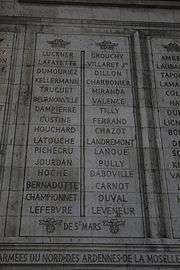Charles Leclerc de Landremont
Charles Hyacinthe Leclerc de Landremont (21 August 1739 – 26 September 1818)[1] was the commander in chief of the Rhine in 1793 during the French revolution.[2] He was also a descendant of the painter Jean LeClerc.
Charles Hyacinthe Leclerc de Landremont | |
|---|---|
| Born | 21 August 1739 Fénétrange, Moselle |
| Died | 26 September 1818 (aged 79) Nancy |
| Years of service | 1759 – 1796 |
| Rank | Divisional general |
| Commands held | Army of the Rhine |
| Awards | Order of Saint Louis |
| Memorials | Name is inscribed under the Arc de Triomphe |
Biography
Before the French revolution
Leclerc first joined the army on 18 April 1759 as a dragoon in the 17th Schomberg regiment before being promoted to cornet on 23 August 1760.[3] He was wounded and taken prisoner after the battle of Bidlingen on 2 March 1761.[3] Upon release he was made second lieutenant on 3 October 1761, before being made first lieutenant in December 1763 and captain on 5 May 1772. On 5 April 1780 he was made captain-commandant of the Schomberg dragoons regimentstationes in Mirecourt.[4][5] On 16 January 1785 he was made a knight of Saint Louis.[3][6]
Officer of the Rhine
On 23 November 1791 he was made lieutenant-colonel, and then colonel on 12 July 1792, and finally Maréchal de camp to the l'armée de la Moselle on 5 October 1792.
Commander in chief of the Rhine army
On 18 August 1793 he was appointed acting commander in chief of the Rhine army, replacing Alexandre de Beauharnais, who had fallen ill. His post was confirmed 5 days later.[7]
He then created Hussards du corps des Partisans de l'Armée du Rhin, a body of hussars.
Arrest and imprisonment
On 29 September 1793 he was suspended and then arrested before being taken to Prison de l'Abbaye, without being informed why. Antoine Guillaume Delmas took on his role in the defence of Landau and refused to replace him. Landremont was then charged with treason.[8]
In reality he had been falsely accused by his superiors. Maximilien Robespierre considered him dangerous. He notes the following about Landremont: "He is noble, very noble, filled with the favours of a tyrant",[9] and who "has done nothing of the excellent troops he commands".[10] Robespierre also accused him of being a "treacherous general".
He was released from prison upon the downfall of Robespierre on 27 July 1794. He was appointed on 24 May 1795, as inspector general of the mounted troops and he returned to the 17th military division in Paris.[11]
Honours
His name is among those inscribed on the Arc de Triomphe.

References
- Michel (27 November 2016). "Леклерк де Ландремон (Charles-Hyacinthe Leclerc de Landremont) Шарль-Гиацинт (1739—1818)". Наполеон и революция (in Russian). Retrieved 10 May 2019.
- Chuquet 1892, pp. 5–6.
- "General Charles-Hyacinthe Leclerc de Landremont". www.frenchempire.net. Retrieved 10 May 2019.
- Jomini 1820, p. 299.
- Montandre-Lonchamps, René Louis de Roussel, État militaire de France pour l'année 1758-93, 1786, p. 138.
- Roque 1866, p. 31.
- Joseph Adolphe Aubenas, Histoire de l'impératrice Joséphine, page=215
- Jomini 1820, p. 398.
- Louis XVI of France, selon les révolutionnaires.
- Roux, Prosper; Buchez, Philippe. "Histoire parlementaire de la révolution française ou, Journal des assemblées…": 150. Cite journal requires
|journal=(help) - Walter, Gérard. "Répertoire de L'histoire de la Révolution Française". Bibliothèque nationale (France), Département des imprimés: 279. Cite journal requires
|journal=(help)
External links
Bibliography
- Jomini, Antoine Henri (1820). Anselin et Pochard (ed.). "Histoire critique et militaire des guerres de la Révolution" (in French). 1–2. Paris. Cite journal requires
|journal=(help)CS1 maint: ref=harv (link) - Bertaud, Jean-Paul (2001). Librairie Arthème Fayard (ed.). "Le duc d'Enghien" (in French). ISBN 978-2-213-64778-4. Cite journal requires
|journal=(help)CS1 maint: ref=harv (link) - Michelet, Jules (1888). Alphonse Lemerre (ed.). "Histoire de la Révolution française". Cite journal requires
|journal=(help)CS1 maint: ref=harv (link) - Charavay, Étienne (1897). imprimerie Nationale (ed.). "Correspondance général de Carnot, tome 3": 22. Cite journal requires
|journal=(help)CS1 maint: ref=harv (link)